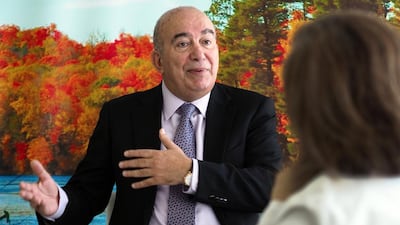Jack Matar, the chairman of the Canadian Business Council in Abu Dhabi, is in the middle of his two-year term. He has served as chairman twice before and decided to run again last year. The 230 members of the council work in many different industries across the UAE, such as services, food, hospitality and finance.
How do you see the current situation regarding the economy of the UAE?
In the Canadian business community, we have full confidence in the measures taken in different sectors of the economy. I guess the oil price will soon stabilise. Of course there is a question mark [about the number of new projects launched by the government next year], but I have to be optimistic and it has to be better than 2016 because the economy will have to stabilise. And when the business community gets accustomed to [the low oil price environment], then things will go back to normal.
How long do Canadian companies take to decide to open in the UAE?
Usually and strategically, between the decision of moving and opening, it takes between six months and one year, because they come and they study and after one year, a lot of companies decide not to stay. They test the water, they have a partnership, they study … The Canadians are not fortune hunters. They would like to come for a stable market because they have a lot to offer like high technology. They are not trying to start from zero. Canadian companies are coming with an added value to the local economy.
So the oil price falling last year had a strong effect on the number of newcomers settling here?
A little bit, not a lot. From Canada, the companies that decide to come here are in sectors such as technology, instrumentation, things that have nothing to do with oil. Canada is well-known for its new technology.
Do Canadian companies already here have a plan B to pull out from the UAE?
Plan B is there for everybody. There is nobody who works without plan B, or even plan C. Canadian companies are here to stay. I am getting calls from Canadians who left the country, left Abu Dhabi, and they are trying to come back and work for any salary because life in Abu Dhabi is much easier than living in Canada.
In what way?
Salaries, ease of life, no taxes. It is an easy environment. The weather is the most important factor. Canadian weather is hard – we have six months of freezing cold and snow. It goes down to minus 35C, average is minus 10C and 0C is spring. So when they have sun here for 330 days per year, that’s why Canadians love the weather here.
What are the opportunities for Canadian companies with regards to the economic diversification of the UAE?
Canadians are not into [oil and gas] exploration, but they have the technology for all other industries – what we call the control systems, electronics, software … once the economy is diversified, obviously the UAE wants to improve its own industries and take them to the next level and the next. They will require such technology, and Canadians have got it.
How do members of your business council find the UAE's process of Emiratisation?
We feel that it is the right of the country to train its citizens and employ them. The UAE is not for foreigners, it is for the Emiratis, so we are guests. [Emirati candidates have the right] skills but experience is the problem. But one thing about the Emiratis: they are very fast to learn. They want to work.
You will find people ages 26 to 27 years old with two or three years of experience, and once appointed in senior positions they are doing excellent jobs. Emiratis have a lot of options – in the government they get high salary and fewer hours and less stress, in the oil companies more or less the same, but now they are pushing more. In the private sector it is harder for Emiratis – we work long hours. The pay is good but it is not like oil companies or government, so they need to accept less.
What do you see when Emirati women join the workforce?
I have all my respect for the local women because apparently they are now dominating most of the government offices – they are all women in the traffic department, labour department … they are efficient and they are very helpful. This is as a result of the graduate rate at universities. I believe Emirati women are getting to somewhere and getting the country to another level.
So you think they are the future?
Absolutely.
Is there any partnership between Canadian businesswomen and Emirati businesswomen?
On a very limited scale. Also, not so many Canadian women are in businesses here. There are women working at institutions. The management of the Higher Colleges of Technology is Canadian and there are a lot of Emirati students going to Canada. You see a lot of Emiratis in Montreal and Toronto.
Where do you see Emirati women flourishing in the post-oil period?
They will be everywhere, but first government, oil and gas, and eventually they will go in the private sector. I see a good future for them; an excellent future because they are willing to work, some of them have started their own businesses.
Do you organise any event regarding women?
No, except for the International Women’s Day.
Do you see an effect on Emiratis studying in Canada?
Of course. Studies have an effect. Students go young to university for undergraduate studies; the personality of the student is moulded towards this new culture they adopt, so when they come for business they will want to continue with the same mentality and the same people.
business@thenational.ae
Follow The National's Business section on Twitter

